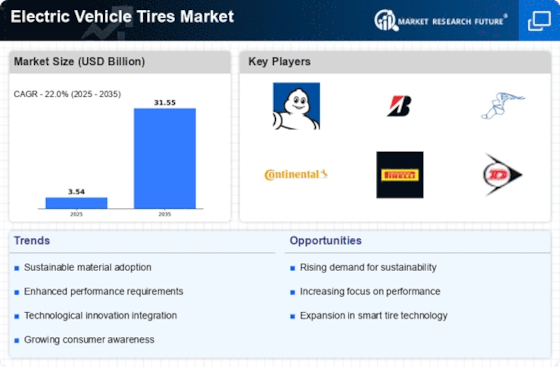Regulatory Support
Regulatory frameworks supporting electric vehicle adoption are a significant driver for the Electric Vehicle Tires Market. Governments worldwide are implementing policies that encourage the use of electric vehicles, including incentives for consumers and manufacturers. For example, tax rebates and subsidies for electric vehicle purchases are becoming more common, which indirectly boosts the demand for electric vehicle tires. In 2025, it is anticipated that regulatory measures will lead to a 20% increase in electric vehicle sales, subsequently driving the tire market. This supportive environment not only fosters growth in the electric vehicle sector but also creates opportunities for tire manufacturers to align their products with evolving standards and consumer expectations. Thus, regulatory support is a key factor influencing the Electric Vehicle Tires Market.
Technological Innovations
Technological advancements play a crucial role in shaping the Electric Vehicle Tires Market. Innovations such as advanced rubber compounds, improved tread designs, and smart tire technologies are enhancing performance and safety. For instance, the integration of sensors in tires allows for real-time monitoring of tire pressure and temperature, which can significantly improve vehicle efficiency. In 2025, it is projected that the market for smart tires will expand by 30%, driven by the increasing adoption of electric vehicles. These innovations not only enhance the driving experience but also contribute to the overall efficiency of electric vehicles, making them more appealing to consumers. As a result, manufacturers that invest in research and development are likely to thrive in the competitive landscape of the Electric Vehicle Tires Market.
Sustainability Initiatives
The increasing emphasis on sustainability is a pivotal driver for the Electric Vehicle Tires Market. As consumers become more environmentally conscious, manufacturers are compelled to innovate and produce tires that minimize ecological impact. This includes utilizing sustainable materials and processes in tire production. In 2025, it is estimated that the demand for eco-friendly tires will rise by approximately 25%, reflecting a broader trend towards sustainable transportation solutions. Consequently, companies that prioritize sustainability in their tire offerings are likely to gain a competitive edge, appealing to a growing segment of eco-aware consumers. This shift not only enhances brand reputation but also aligns with regulatory frameworks aimed at reducing carbon footprints, thereby propelling the Electric Vehicle Tires Market forward.
Consumer Demand for Performance
The growing consumer demand for high-performance tires is a notable driver in the Electric Vehicle Tires Market. As electric vehicles gain popularity, consumers are increasingly seeking tires that offer superior handling, durability, and efficiency. This trend is particularly pronounced among performance-oriented electric vehicle models, where tire performance can significantly impact overall driving experience. In 2025, it is expected that the market for high-performance electric vehicle tires will grow by 15%, reflecting this shift in consumer preferences. Manufacturers are responding by developing specialized tires that cater to these demands, incorporating features such as low rolling resistance and enhanced grip. This focus on performance not only meets consumer expectations but also contributes to the overall appeal of electric vehicles, thereby driving growth in the Electric Vehicle Tires Market.
Expansion of Charging Infrastructure
The expansion of electric vehicle charging infrastructure is a critical driver for the Electric Vehicle Tires Market. As charging stations become more prevalent, the convenience of owning electric vehicles increases, leading to higher adoption rates. This growth in electric vehicle usage directly correlates with the demand for electric vehicle tires. In 2025, it is projected that the number of charging stations will increase by 40%, facilitating greater accessibility for electric vehicle owners. Consequently, this infrastructure development not only supports the growth of the electric vehicle market but also enhances the demand for specialized tires designed for electric vehicles. Manufacturers that align their products with this expanding infrastructure are likely to benefit from increased sales and market share in the Electric Vehicle Tires Market.

















